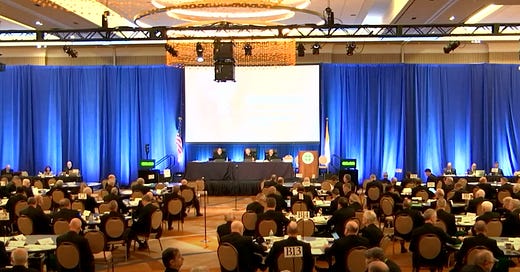
USCCB: Federal funding changes have ‘devastating impact’ on migrant families, minors
As the USCCB ends federal migration "cooperation agreements," programs will wind down and offices will shift to "advocacy."
After an announcement Monday that the U.S. bishops’ conference will not renew some refugee service agreements with the federal government, a conference official told The Pillar that government policy shifts have had a “devastating impact” on refugees.
The bishops’ conference also told The Pillar that while two-thirds of refugee and migration services employees at the USCCB have already been laid off this year, there will be more staffing changes in the migration office.
—
The USCCB announced Monday that it had decided “not to renew the cooperative agreements with the federal government related to children’s services and refugee support,” because without federal payments and funding, “we simply cannot sustain the work on our own at current levels or in current form.”
The terminated cooperative agreements with the federal Department of Health and Human Services were worth roughly $140.6 million, a conference spokesperson told The Pillar, as payment for services provided by Catholic Charities agencies and other Catholic institutions providing assistance in various programs for unaccompanied minors and other immigrant children in the United States.
According to Bill Canny, executive director of the USCCB’s Department of Migration and Refugee Services, those programs included assistance to unaccompanied migrant minors and their potential sponsors in the United States, as they transition to new communities in the United States, along with programs assisting newly arrived families and students acclimating to the U.S. educational system.
The USCCB’s agreement for “post-release services,” for example, aims to assist with transitions as unaccompanied minor migrants are “released from federal custody to family members and other caregivers throughout the United States,” according to a USCCB resource guide.
In particular, post-release services can include federally funded home studies, if a child “is a victim of severe trafficking,” has a disability, has been physically or sexually abused, or if a child might be placed in a home that “clearly presents a risk of abuse, maltreatment, exploitation, or trafficking to the child.”
Those studies, and other case management resources, are “essential to reducing the risk of harm to children,” and can reduce “the likelihood of family breakdown, placement into foster care, commission of crime, recidivism into the juvenile justice system, recidivism into treatment placement, or first time entry into adult corrections.”
The USCCB’s Department of Migration and Refugee Services says it has maintained a “national network of social service agencies” to provide “a necessary safety net for families who have been separated by migration.”
That safety net includes home visits and risk-assessments, referrals to community resources, and advocacy for access to services.
But Canny told The Pillar that as the USCCB and Catholic Charities agencies wind down service provision agreements with the federal government, they will “attempt to finalize unaccompanied children’s cases and make recommendations to [Office of Refugee Resettlement] regarding assigning the children to appropriate sponsors.”
“If cases remain open after the program concludes, they will be returned to ORR and reassigned to other providers. There should be minimal service interruption, as many providers are available, and the number of unaccompanied children needing this service is diminishing,” Canny explained Tuesday.
Canny told The Pillar that even while the bishops’ conference has not been paid for various refugee and migration services since January, it is winding down some federal agreements over the next few months, “to ensure our partners have adequate time to transition clients into other community-based programs that offer ongoing support. Despite this hope, there may be locations where adequate alternatives are not available.”
“We will do our best to identify ways to support these individuals, but the loss of federal assistance has already had—and will continue to have—a devastating impact on the beneficiaries we serve,” Canny said.
USCCB spokesperson Chieko Noguchi told The Pillar that decision announced this week are for programs other than the “cooperative agreements with State Department to do resettlement work.”
The bishops’ conference is engaged in litigation over back pay on resettlement contracts with the federal State Department, which owes the USCCB more than $20 million for contracted work to resettle refugees. While the litigation over back pay continues, the State Department in February canceled the government’s refugee resettlement contract with the USCCB, which Noguchi said was worth some $65 million annually.
Together, the migrations contracts between the USCCB and the federal government were worth about $200 million, most of which was passed through the conference to Catholic agencies during the on ground case work to serve migrants under the contract terms.
Noguchi acknowledged that the USCCB’s decision not to renew contracts, “will have an impact on Conference staffing in the weeks ahead as we close our resettlement and children’s services operations.”
Of the 143 conference staffers during refugee work before the inauguration of President Donald Trump, “there have already been 93 USCCB staff who have worked for MRS who have received layoff notices this year. As both the resettlement and children’s services offices close by the end of this year, other MRS staff will likely be impacted.”
Remaining staff in the office “will shift to focus on policy, advocacy and communications in the area of migrants and refugees,” Noguchi said.










I don’t find the “conscious uncoupling” of the bureaucracy of the USCCB with the federal government a bad thing at all in the long run. In the short run, there will definitely be some pain.
I am very glad that the administration is cutting off the federal teat. If we're going to be Catholic charities, then we should be Catholic, not “We’re funneling the government funds through for you.” The dioceses of Wichita and Lincoln, if I'm not mistaken, and some others have figured out how to do their Catholic Charities programs without government money. Everyone else, including the USCCB, should do the same.